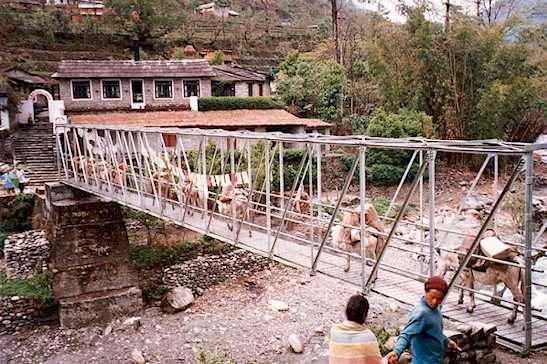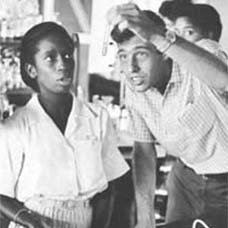
After bombings at the American Center in Kathmandu last September, the U.S. government decided that Nepal was not safe for the 80-odd Peace Corps volunteers and withdrew them
Nepal stands on brink of a political abyss
BY AKHILESH UPADHYAY
Akhilesh Upadhyay is editor of Nation Weekly, from Kathmandu. Sheryl McCarthy is off.
January 6, 2005
Remember the 1970s' Bob Seger song about going to Kathmandu because it was supposed to be some kind of Shangri-la? He'd sing a different song today.
In 1996 a group of Communists decided that Nepal's fledgling "bourgeois" parliamentary democracy was not good enough for the impoverished Himalayan kingdom, where the average Nepali makes less than $2 a day. Nine years later, the Maoist "people's war" has seen more than 10,000 deaths. Indeed, many observers say that Nepal's insurgency is the most violent one in Asia, with an average daily toll of 12, which threatens to reach Iraqi proportions.
How did it get so bad in these idyllic mountains, which were once the most sought-after destination for the U.S. Peace Corps volunteers? They're not even allowed in the country now. After bombings at the American Center in Kathmandu last September, the U.S. government decided that Nepal was not safe for the 80-odd Peace Corps volunteers and withdrew them.
Few took the Maoists seriously when they launched their attacks in a remote mountain district almost a decade ago. Now a vast number of villages, especially in the western hills, are either under rebel control or without the presence of the government, whether it's the local police or the army.
To make matters worse, since 2002 the political parties' No. 1 enemy in Kathmandu seems to have been King Gyanendra himself, and that has paralyzed the government's response to the insurgency. The king dismissed an elected government and has since appointed three governments, the last of which headed by Prime Minister Sher Bahadur Deuba has been in office only since June. The parliament and the local governments remain dissolved. The king has entrusted the Deuba government to hold elections by April, but the Maoists have threatened to create a bloodbath should the government go ahead with the vote. And no one takes their threats lightly.
Meanwhile, both the Maoists and the government forces have been responsible for atrocities. The Maoists and security forces have carried out summary executions, arbitrary arrests, torture and prosecutions. Groups, such as New York-based Human Rights Watch, have even documented cases where human rights workers, journalists and lawyers have been targeted with impunity. Should the trend continue, Nepal will soon descend into a lawless state, much like another country in the region, the pre-9/11 Afghanistan. Indeed, not just its extreme poverty but Nepal's mountainous terrain, rugged valleys and extreme inaccessibility make it an easy breeding ground for an insurgency.
Why should the world care?
There are already evident spillovers. Nepal's Maoists have forged strong ties with fellow Maoists in India. Recently a railway track along the New Delhi-Kolkata section was blown up by Naxalites, who share a close working relationship with Nepal's Maoists. There are unconfirmed reports that Maoists have penetrated Bhutan and Bangladesh, too.
The United States, India, Britain and European Union - Nepal's major donors - should tell the political parties and King Gyanendra to work together. Although Nepal's allies hope that more military assistance will force the Maoists to the negotiating table and a cease-fire, there are no signs of success. The last cease-fire collapsed in August 2003 amid mutual suspicions of military buildups.
Still, there have been some bright spots. New conditions on U.S. military assistance now require fundamental change in the way the security forces deal with human rights. New Delhi and Washington have conspicuously supported the anti-Maoist campaign and the revision in U.S. policy, albeit belated, comes as a strong political statement to Nepal's government.
The international community should find other ways to nudge Nepal's warring political parties to talks before it is too late.
Subscribe to Newsday home delivery
Copyright © 2005, Newsday, Inc.










